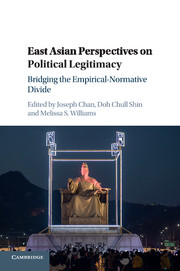Book contents
- Frontmatter
- Contents
- List of Contributors
- Preface and Acknowledgments
- 1 Political Legitimacy in East Asia: Bridging Normative and Empirical Analysis
- 2 Reasons to Obey: “Multiple Modernities” and Constructions of Political Legitimacy
- 3 Do East Asian States Enjoy a Legitimacy Premium?
- 4 Political Legitimacy in China: A Confucian Approach
- 5 Political Legitimacy in Hong Kong: A Hybrid Notion
- 6 The Evolution of Political Legitimacy in Singapore: Electoral Institutions, Governmental Performance, Moral Authority, and Meritocracy
- 7 Polarized Politics, Government Legitimacy, and Democratic Legitimacy in Taiwan
- 8 The Legitimacy of Democratic Rule in Korea: From the Perspective of the Mass Citizenry
- 9 Political Legitimacy, Satisfaction, and Japanese Democracy
- 10 Legitimacy as a Hybrid Phenomenon
- Index
7 - Polarized Politics, Government Legitimacy, and Democratic Legitimacy in Taiwan
Published online by Cambridge University Press: 30 December 2016
- Frontmatter
- Contents
- List of Contributors
- Preface and Acknowledgments
- 1 Political Legitimacy in East Asia: Bridging Normative and Empirical Analysis
- 2 Reasons to Obey: “Multiple Modernities” and Constructions of Political Legitimacy
- 3 Do East Asian States Enjoy a Legitimacy Premium?
- 4 Political Legitimacy in China: A Confucian Approach
- 5 Political Legitimacy in Hong Kong: A Hybrid Notion
- 6 The Evolution of Political Legitimacy in Singapore: Electoral Institutions, Governmental Performance, Moral Authority, and Meritocracy
- 7 Polarized Politics, Government Legitimacy, and Democratic Legitimacy in Taiwan
- 8 The Legitimacy of Democratic Rule in Korea: From the Perspective of the Mass Citizenry
- 9 Political Legitimacy, Satisfaction, and Japanese Democracy
- 10 Legitimacy as a Hybrid Phenomenon
- Index
Summary
INTRODUCTION
Since democratization in 1996, political legitimacy has become the dominant issue in every presidential election in Taiwan. While the actual form of the debate varies, we can always grasp the gist with a nuclear theme: which political group that the presidential candidate represents can safeguard Taiwan's political sovereignty and meanwhile continue a fast-growing economy? On the surface, this question is not philosophical, and whoever proposes a convincing policy is more likely to win political legitimacy via an electoral victory. Deep down, however, many controversies associated with different political, ideological, and historical beliefs are entangled, and the battle for political legitimacy never ends with any particular election result. To understand the problem of political legitimacy in Taiwan, we have to identify the key dimensions of those controversies and explain how they affect the political trajectory in a given period of time.
The key dimensions of the political legitimacy problem can be characterized into four issue areas: (1) unification vs. independence, (2) Chinese vs. Taiwanese identity, (3) greater vs. lesser economic integration with China, and (4) the KMT's economic legacy vs. the DPP's antiauthoritarian legacy. These topics are closely related, and most of the time we can use the first term in each of these contrasts to describe the fundamental political views of KMT supporters, and the second term to describe the views of DPP supporters. Nevertheless, even among those who support the same political camp, discourses in these topics are easily malleable and reframed. Therefore, a proper characterization of this distinct political situation is crucial to illuminate how different power contenders justify their political legitimacy in running their presidential campaigns.
Over nineteen years of democracy in Taiwan, the political legitimacy crisis rose to a significant level during Chen Shui-bian's two-term presidency between 2000 and 2008. The most prominent sign was the intense polarized politics in which the political tension between supporters of the major contenders for power, the KMT and the DPP, was consistently high. Specifically, it was related to a deep political distrust in which each camp denied the other's right to rule. This sentiment was further aggravated by the electoral controversy in the 2004 presidential election and the subsequent political demonstrations. Some incidents even developed into serious political turmoil that could have jeopardized Taiwan's democracy. The crisis finally abated after KMT won a landslide victory under the leadership of Ma Ying-jeou in the 2008 presidential election.
- Type
- Chapter
- Information
- East Asian Perspectives on Political LegitimacyBridging the Empirical-Normative Divide, pp. 166 - 189Publisher: Cambridge University PressPrint publication year: 2016



